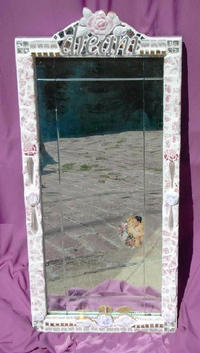| Thursday, December 19, 2002 |
| Mirror Dream |
 I was listening to a tape by anthropologist and shaman Hank Wesselman, of a session I missed at the Prophet's Conference, and he introduced a shamanic journey and started drumming. The idea was that one would go to one's garden in the dreamworld and receive some wisdom or meet somebody. I stopped the car, and sat in the dark. I was listening to a tape by anthropologist and shaman Hank Wesselman, of a session I missed at the Prophet's Conference, and he introduced a shamanic journey and started drumming. The idea was that one would go to one's garden in the dreamworld and receive some wisdom or meet somebody. I stopped the car, and sat in the dark.
My garden had a waterfall and a jungle and a lot of land to explore, and caves. I went into a cave which went down, taking several turns and forks. There I had a vision, in the form of a multi-dimensional lightshow of sorts. It is hard to describe, but there was a mirror effect going off into several dimensions at the same time. Almost a thru-the-lookingglass thing in several directions. You can't reflect yourself in a mirror without having, well... a reflection. Action and Reaction, or rather, both at the same time. And there seemed to be some wisdom there, applying to knowledge and how to organize it. As I came out of it, sitting in the dark, I still didn't quite get it, but I figured I'd better write it down, as it might fall into place later. But what I think of right away is: information is usually disconnected from what it is about. You write or talk about something or someone, and they don't necessarily know, and there's no mechanism for ensuring it is valid or useful. If they move or change, your words don't move or change with them. But in a way, they should. Our information is often like pieces of paper we crumble up and throw in the general direction of what we're talking about. But it should really be like rubber bands attached to what we're talking about, stretching and following. A two-way link. Is that maybe a difference between information and knowledge? Information is disconnected and static, but knowledge is connected and fluid? If you move, the reflection in the mirror moves. If you walk away, the reflection walks away. But there are many mirrors we're reflected in simultaneously, so as we walk away from one, we might get closer in another. [ Knowledge | 2002-12-19 01:40 | 5 comments | PermaLink ] More > |
| Reputation Systems |
| Alex Halavais talks about an experiment with a karma/reputation system in a class he was teaching. The idea being that one had a certain number of points, and one could give them to others for doing good deeds, according to a simple system. But people cheated and the system fell apart.
I've noticed myself that it is rather difficult to make a functional reputation system. There is one in NCN, where people mark others as being 'acquaintances', 'friends' or 'comrades', meaning that they're somewhere on a scale between 'I know them' and 'I would trust them with my life'. Some of the problems I've noticed are:
[ Organization | 2002-12-19 03:58 | 2 comments | PermaLink ] More > |
| Blog Moods |
"I'm not sure if this is a rehash of an old idea, an improvement to it, or something totally useless, but here goes:Hm, yeah. It is just that I wouldn't be happy with simple moods like 'happy','sad' and 'tired'. For me it is more that different times have a different energy. Some days are for lying in your bed reading comic books. Other days are high energy days for getting something done. I don't always pay attention to that, so sometimes I go against the flow, and try to make something happen that just isn't gonna happen on such a day. But, yeah, I'd like some way of flagging it, or noticing it collectively. [ Patterns | 2002-12-19 04:12 | 1 comment | PermaLink ] More > |
| It's an alien world |
 NY Times reports that a naive psychology researcher at Harvard advertised for people who had been 'contacted or abducted by space aliens', thinking that it would be a great way to find a few suggestible weirdos who were out of touch with reality, so that she could study how fabricated memories work. Instead she got overwhelmed, both with responses from lots of people with abduction experiences to tell about, and then from people ridiculing it, and finally from fellow Harward researchers who actually had been studying the phenomenon. NY Times reports that a naive psychology researcher at Harvard advertised for people who had been 'contacted or abducted by space aliens', thinking that it would be a great way to find a few suggestible weirdos who were out of touch with reality, so that she could study how fabricated memories work. Instead she got overwhelmed, both with responses from lots of people with abduction experiences to tell about, and then from people ridiculing it, and finally from fellow Harward researchers who actually had been studying the phenomenon.
For the record, I have memories of being abducted by aliens as well, and I frequently had nose bleeds as a child. And I'm not a particularly suggestible or gullible person. But I don't have much urge to convince anybody about what is real and what is not. I think our universe is big and mysterious, and there is a lot of things we haven't really figured out yet about how reality works, so sometimes it is best to keep an open mind and reserve judgment for later. As to the fabricated memory thing that the Harvard doctor was researching, yes, as a counselor and a certified hypnotherapist myself, I agree that this can be quite a problem in a therapeutic setting. Particularly when it comes to recovered memories of childhood sexual abuse. I think that can possibly happen, but it might just as well be something else. Just because one remembers it, doesn't necessarily mean it physically happened that way. I've had clients who suddenly remembered childhood molestation, where I must admit I didn't quite believe it. It can be very productive to work on the issues related to that, regardless, but it is very problematic if the client considers making the jump to go home and actually confront somebody with what they supposedly did 30 years ago, if all you have is some suddenly recovered memories. Bad idea. Processing it emotionally and mentally versus acting on the reality of it in the material world are two different things. [ Culture | 2002-12-19 04:26 | 5 comments | PermaLink ] More > |